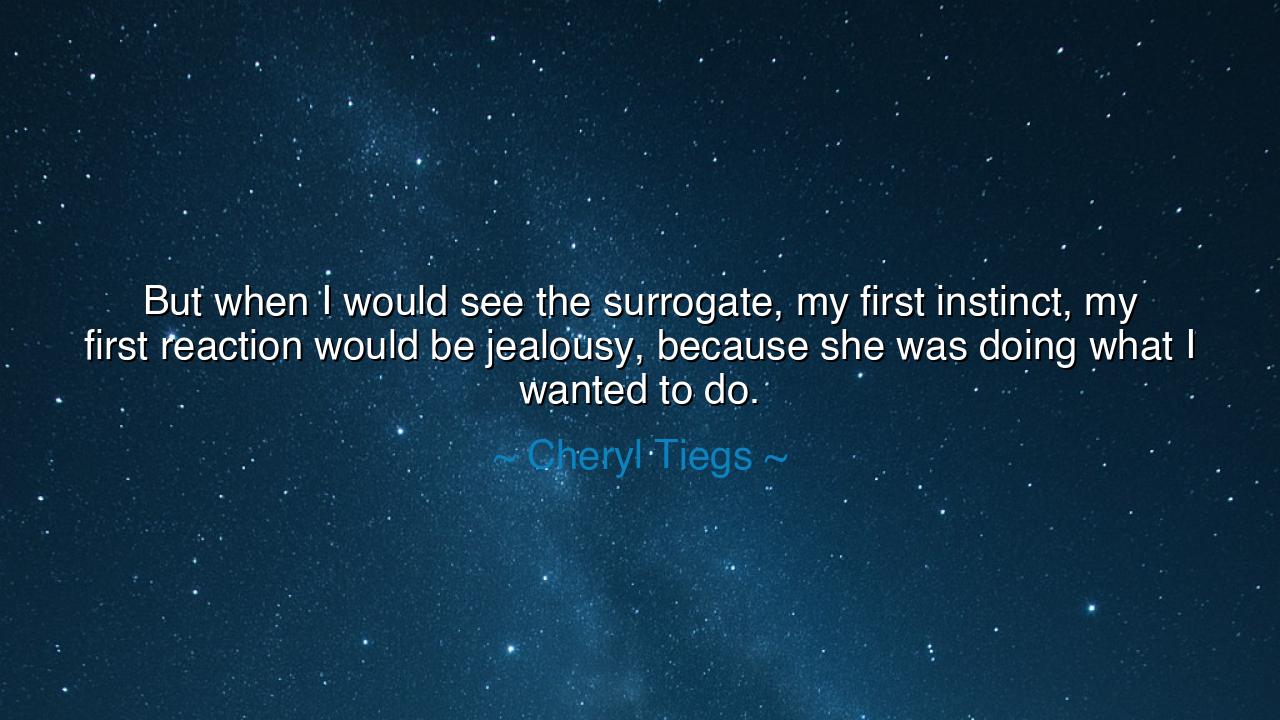
But when I would see the surrogate, my first instinct, my first
But when I would see the surrogate, my first instinct, my first reaction would be jealousy, because she was doing what I wanted to do.






There is a quiet sorrow hidden within the words of Cheryl Tiegs, when she confessed: “But when I would see the surrogate, my first instinct, my first reaction would be jealousy, because she was doing what I wanted to do.” In that sentence lies one of the oldest truths of the human heart — that love and jealousy often spring from the same soil. What she expresses is not envy of another’s power, but the pain of longing unfulfilled — the ache of watching someone live the experience her heart yearned for most deeply. It is the jealousy of love, not of vanity; of motherhood, not of competition.
To understand her words, we must first understand the nature of yearning. There are desires that come from pride — for status, for admiration, for victory — and there are desires that arise from the deepest chambers of the soul, where life itself cries to create life. Cheryl Tiegs, as a woman unable to bear her own child, faced the paradox of gratitude and grief intertwined. She was thankful to the surrogate who made her dream possible, yet she could not silence the small, aching voice that whispered: “That should have been me.” Such jealousy is not low; it is sacred pain, born from love’s purest form — the desire to nurture, to give, to bring forth what one cannot.
Even in ancient times, this emotion was known. The matriarch Sarah, wife of Abraham, sent her servant Hagar to bear a son on her behalf. Yet when Hagar conceived, Sarah’s heart was struck by jealousy — not of cruelty, but of heartbreak. She had what she wanted — a child for her husband — yet she could not bear the sight of another woman carrying the promise that had been denied to her. Like Cheryl Tiegs, she felt the piercing contradiction of joy shadowed by envy, love tempered by helplessness. Both women, separated by millennia, reveal the same truth: that even the noblest souls can be humbled by longing.
In these moments, jealousy does not make us lesser; it makes us real. It strips away illusions of control and reveals the fragile humanity beneath. When Tiegs speaks of her “first reaction,” she reminds us that jealousy is not always a choice — it arrives unbidden, like a shadow cast by light. But she also shows the power of awareness: by naming it, by acknowledging it without malice, she transforms it into understanding. The soul cannot overcome what it refuses to face; and to face jealousy is to begin to heal from it.
Yet there is wisdom hidden in this pain. For jealousy, though sharp, can become a mirror — showing us what we truly cherish. Tiegs’ words remind us that jealousy is love in disguise, a signal of what our heart values most deeply. It is not to be shunned, but to be examined. When we feel it, we are being called to accept our own limitations, to learn gratitude for what life has given, and compassion for those who hold what we cannot. The heart, once humbled, can expand beyond envy into reverence — seeing in another’s joy not a theft of one’s own, but a reflection of the same divine gift shared across souls.
In this way, her confession becomes a teaching in humility and grace. She could have hidden her jealousy, or denied it, or let it fester into bitterness. Instead, she spoke it — gently, honestly — as one speaks of a wound that has begun to heal. That honesty itself is a triumph. For when love and pain coexist, only truth can reconcile them. Jealousy confessed becomes compassion born, the seed of deeper empathy toward all who suffer in silence.
So let this be the lesson for those who walk through similar valleys of the heart: when jealousy rises, do not curse it. Let it speak. Ask what it reveals about your love, your longing, your unfulfilled dreams. Let it humble you, not harden you. And then, as Cheryl Tiegs did, choose to bless the one who carries what you cannot, knowing that their joy is, in some quiet way, also your own. For love, when purified of envy, becomes something holier — the love that endures even when it must bow before fate.
Thus, her words endure as a testament to the strength of tenderness — that even in the ache of jealousy, there lies beauty, if the heart dares to be honest. It is not weakness to feel humbled; it is the beginning of wisdom. For in accepting our own pain, we learn to celebrate the lives of others, and in doing so, we are healed by the very love that once wounded us.






AAdministratorAdministrator
Welcome, honored guests. Please leave a comment, we will respond soon